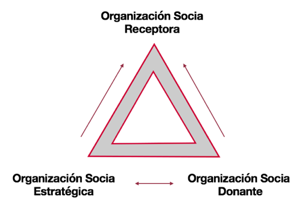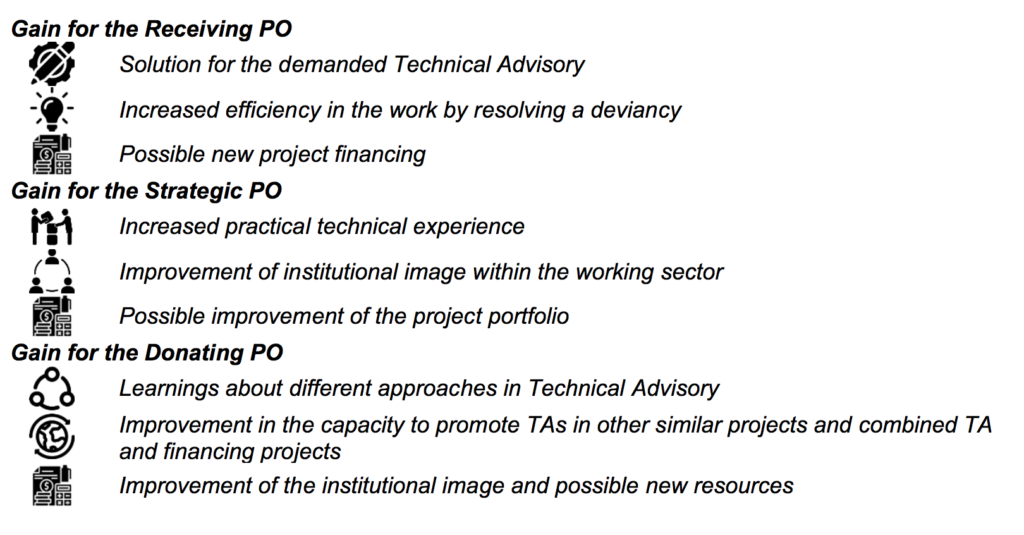Make Your Experiences Count. They Can Change the World.
LET’S BRING ALL OF OUR KNOWLEDGE AND EXPERIENCES TOGETHER.
TOGETHER WE KNOW MORE. TOGETHER WE ACHIEVE MORE. TOGETHER WE DO BETTER.
LET’S BRING ALL OF OUR KNOWLEDGE AND EXPERIENCES TOGETHER.
TOGETHER WE KNOW MORE. TOGETHER WE ACHIEVE MORE. TOGETHER WE DO BETTER.
Published: May 7, 2020
A Triangular Technical Advisory is a so-called south-south cooperation, in which the capacities of one of the Partner Organizations are beneficial for another one or more Partner Organizations. As a new instrument within the Technical Advisory Program this innovative concept focusses on knowledge transfer between the Partner Organisations. One PO, the ‘Receiving Partner Organisation’ demands advisory from HORIZONT3000 (Donating Partner Organisation) and together they research and establish which institution, association, research center, university, organisation, etc. could provide professionals that are available to support the ‘Receiving Partner Organisation’ with its Technical Advisory.

Specific objectives are defined for the Receiving PO and the experts of the Strategic PO carry out the strategic planning, workshops and trainings and accompany the process. With the expenses of said professionals paid, the project normally lasts 12 months and HORIZONT3000 supports monitoring and evaluation. Apart from the fact that the advice comes from the south instead of the north, the experience and the lessons learned are not only beneficial for the receiving OS, but can also be beneficial for the Strategic OS once the professional returns from the Receiving OS.
In Central America two pilot projects of the Triangular Technical Advisory (TTA) are carried out, one for each of the sectors of HORIZONT3000: Human Rights – Civil Society and Rural Development – Natural Resource Management.
‘Strengthening of an Observatory for Livelihoods and Territorial Development of the region around Lake Atitlán Basin (Fortalecimiento de un Observatorio de Medios de Vida y Desarrollo Territorial de la Cuenca del Lago Atitlán)’ and ‘Strengthening of Multiplication Systems in Agroecology for 3 Partner Organisations in Guatemala (Fortalecimiento de los Sistemas de Multiplicación del Conocimiento en Agroecología en 3 OS en Guatemala)’.
In the project “Strengthening of an Observatory for Livelihoods and Territorial Development of the Lake Atitlán Basin” the focus is on the development of an observatory administered by the Comité Campesino del Altiplano – CCDA (receiving Partner Organization). The general objective is “Strengthen territorial capacities for evidence-based advocacy through citizen observation of public policies and implementation of public administration projects in the Lake Atitlán Basin (in Guatemala).” The goal is to establish an efficient and effective Observatory, that is culturally appropriate, specialized in gender and that is sustainable to function satisfactorily beyond the current project period.
The central intervention of the Observatory of Livelihoods and Territorial Development of the Lake Atitlán Basin is to increase visibility of programs dealing with women’s participation and access, food security and environmental protection in Guatemala. Due to a long history of repression and discrimination related to ethnicity, gender and social class, the indigenous population in Guatemala often finds itself in a situation of defencelessness. It is vital to them to know their human rights and the actions to organize themselves facing responsible authorities. The project’s target groups are women and the youth, who are considered the most vulnerable and marginalized groups.
The strategic Partner Organization ORMUSA (Organización de Mujeres Salvadoreñas por la Paz) is a women’s organization in El Salvador that has lots of experience in the establishment and management of civil society observatories. Through the Technical Advisory they provide consultancy and prepare the planning of the phases and activities in cooperation with:
the receiving Partner Organization, the Comité Campesino del Altiplano – CCDA, which is an NGO that fights for access to land and the rights of Mayan farmers in Guatemala.
Within the project “Strengthening Multiplication Systems in Agroecology”, three (receiving) Partner Organizations, which working in the fields of agroecology, food security for indigenous families and adaptation in the wake of climate change, participate in a program fostering knowledge multiplication among their network of promotors. The general objective is to “strengthen the capacities of the Guatemalan civil society organizations (OSR) to promote production and consumption of food that is free of pesticides and the protection of the environment, that allows food sovereignty and security in territorial development with social inclusion.”
Training and education programs for local leadership (e.g. promoters, extension agents, etc.) are an important component for civil society organizations. One big objective is food sovereignty as a part of socially inclusive territorial development. Multiplication of knowledge in agroecological production, practices and technologies for the management of integral farms, gardens or agroecological plots could improve the food situation and create sustainable development in the territory.
The Strategic Partner Organization, FUNDESYRAM (Fundación para el Desarrollo Socioeconómico y Restauración Ambiental) is an organization in El Salvador that promotes Community ecodevelopment and agroecology. They provide consultancy through Technical Advisory following a plan developed together with three receiving partner organizations:
The Comité Campesino del Altiplano – CCDA that fights for access to land and for the rights of Mayan farmers communities in Guatemala, the Pastoral Social – Diócesis de Quiché – PSQ that contributes to improving living conditions of the Quiché population through social education and technical training and the Unión de Agricultores Minifundistas de Guatemala – UAM, a federation that represents the smallholder sector to promote the integral development of its associates.
According to Dr. Diego Santos, our colleague and coordinator of the Program in Central America, the possibility and the efficiency of carrying out a Triangular Technical Advisory depends a lot on the shared interests and values among the tree involved Partner Organisations. “Further, it is essential that each participating PO identifies their interests and determines both, the common foundation and the commitments made, depending on the role that each of them plays. Finally, the TTA only has potential if it is based on positive experiences and if management is in the scope for every involved PO.”
If these premises are given, the goal is to reach a win-win relation for every Partner Organisation participating in the ATT:
